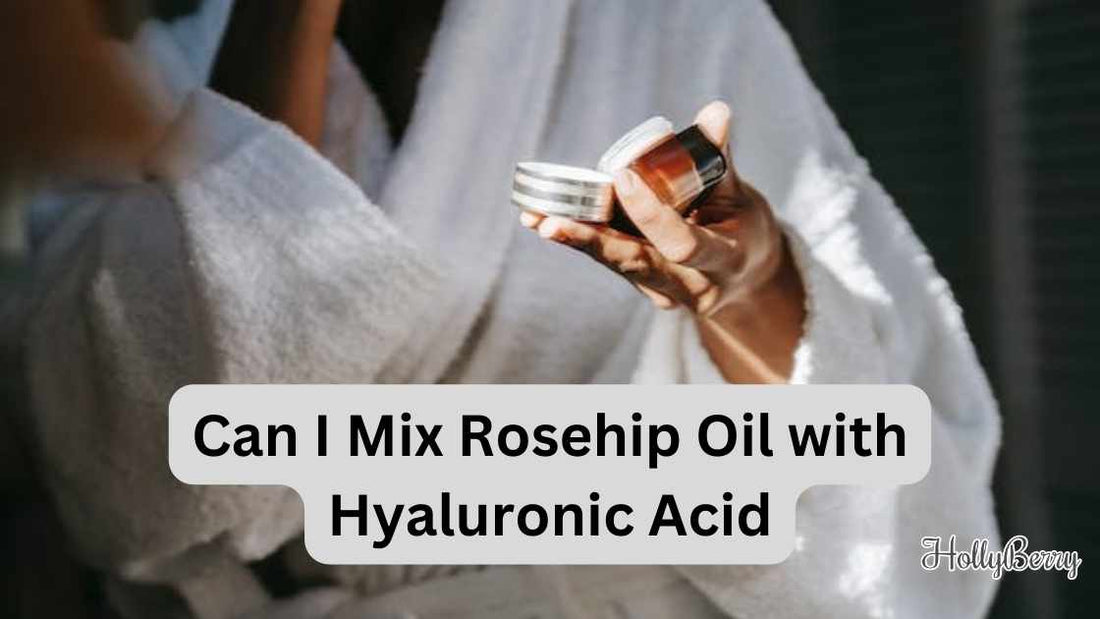
Can I Mix Rosehip Oil with Hyaluronic Acid
Share
Unveiling the Benefits for Your Skin

Skincare enthusiasts often seek to enhance their skin care routine by adding natural oils and active ingredients that promise to improve the appearance and health of their skin.
Among these, rosehip oil has gained popularity for its rich content of vitamins, antioxidants, and essential fatty acids, which are known to promote skin regeneration and improve skin texture.
On the other hand, hyaluronic acid is celebrated for its remarkable ability to retain moisture, leading to plumper and more hydrated skin.
The combination of rosehip oil with hyaluronic acid in a skincare routine is a subject of interest for many.
They may be mixed to take advantage of their complementary properties. Hyaluronic acid can be applied to the skin to hydrate and to create a moisture foundation, followed by rosehip oil to seal in the moisture and add additional nourishment.

Find a range of Hyaluronic Acid serums at our UK store
This duo is often considered effective because rosehip oil not only locks in the moisture provided by hyaluronic acid but also delivers essential nutrients to the skin's barrier, potentially enhancing the overall health and appearance of the skin.
However, it's important to introduce new products into a skin care routine gradually, and patch testing is advised to ensure that the combination is well tolerated.
Each skin type is unique, and while these two ingredients typically work well together, consideration of individual skin sensitivities is crucial.
Understanding Rosehip Oil and Hyaluronic Acid
In skincare, rosehip oil and hyaluronic acid are celebrated for their exceptional properties and benefits.
While rosehip oil is known to nourish and provide antioxidants, hyaluronic acid excels at hydration, effectively helping to prevent transepidermal water loss.
Properties of Rosehip Oil
Rosehip oil is renowned for its high content of essential fatty acids, notably omega-3 (linolenic acid) and omega-6 (linoleic acid), which helps to moisturise and nourish the skin.
It is also a natural source of vitamin A, vitamin E, and vitamin C, all of which contribute to its antioxidant properties. These antioxidants aid in protecting the skin from oxidative stress and promote collagen production, enhancing the skin's overall texture and resilience.
Benefits of Hyaluronic Acid
Hyaluronic acid is a powerful humectant that draws moisture into the skin, thereby providing excellent hydration. It can hold up to 1,000 times its weight in water, which makes it an effective component for reducing the appearance of fine lines and keeping the skin plump.
Its anti-inflammatory properties and ability to act as a moisturiser by aiding in hydration make it a favourite ingredient in skincare formulations aimed at minimising transepidermal water loss and enhancing skin hydrators.
Incorporating Rosehip Oil and Hyaluronic Acid into Your Skincare Regime
Combining rosehip oil with hyaluronic acid can address a myriad of skin concerns. These ingredients work synergistically to provide hydration, improve signs of ageing, and enhance skin elasticity.
Steps for Mixing and Application
To ensure optimal benefits, a patch test is recommended prior to the first application. Once you've determined that both ingredients are suitable for your skin, follow these steps:
- Cleanse your skin thoroughly to remove impurities and any traces of makeup.
- Apply a hydrating serum containing hyaluronic acid to damp skin. This potent humectant draws moisture into the skin, making it plump and radiant.
- While the skin is still moist, gently massage a few drops of cold-pressed rosehip oil onto the face and neck. The oil, rich in antioxidants, supports wound healing and may help reduce the appearance of scars, fine lines, and hyperpigmentation.
For those with dry skin, combine rosehip oil with a moisturising cream to create an occlusive layer, enhancing the skin barrier and preventing moisture loss.
Addressing Specific Skin Concerns
- Sensitive Skin: Rosehip oil, known for its non-comedogenic and anti-inflammatory properties, is typically well-tolerated by sensitive skin. Mix with jojoba oil, which closely mimics the skin's natural oils, to further reduce potential irritation.
- Signs of Ageing: To combat signs of ageing, such as wrinkles and loss of skin elasticity, use products from reputable brands like The Ordinary that specifically target these issues.
- Acne and Oily Skin: When dealing with acne or oily skin, apply a clay mask prior to your routine to absorb excess oil, followed by a facial oil and hyaluronic acid pairing to maintain balance without causing congestion.
Always incorporate sunscreen during the day to protect the skin from UV damage, which can exacerbate issues like pigmentation and scarring. If wearing makeup, rosehip oil can double as a primer to provide a radiant foundation for application.
